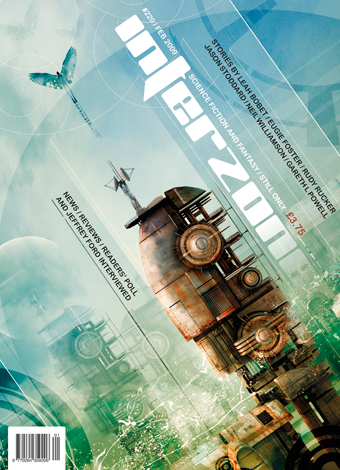 “Monetized” by Jason Stoddard
“Monetized” by Jason Stoddard
“Sinner, Baker, Fabulist, Priest; Red Mask, Black Mask, Gentleman, Beast” by Eugie Foster
“After Everything Woke Up” by Rudy Rucker
“Spy vs. Spy” by Neil Williamson
“Miles to Isengard” by Leah Bobet
“Memory Dust” by Gareth L. Powell
Reviewed by Nathan Brazil
Jason Stoddard‘s “Monetized” is set in a future that may be nearer than we think, “Monetized” deals with a day in the life of Mike Palmetto, whose mother is a self-made media mogul. Mom created an ultra-invasive advertising system called MakeMoMoola, which has spread like a virus, infecting pretty much every aspect of life with ‘opportunities’ to cash in by recommending services, etc. Mike is not in sympathy with the world his mum has helped to make, and when the chance comes along, he rolls the big dice and tries to shake things up. The journey is somewhat pedestrian and the conclusion was entirely predictable. But readers who enjoy fast-paced post-cyberpunk works will find this entertaining.
Despite the rather unwieldy title of “Sinner, Baker, Fabulist, Priest; Red Mask, Black Mask, Gentleman, Beast,” Eugie Foster delivers a cracking story of a human society which has stagnated into something like a bee colony crossed with a perpetual masquerade. Only this masquerade requires all citizens to don masks which literally alter their personalities and functions for a limited period. A citizen might wear a mask that makes him the Queen’s lover one day, and the next a mask that turns him into a torture victim who is skinned alive. All acts are experienced only behind the mask. The true nature of reality is what the protagonist is pushed to discover. This is the best story on offer in this issue.
In Rudy Rucker‘s “After Everything Woke Up” we find that Jayjay and Thuy are newlyweds, in a world where telepathy is common, and creatures, rocks, water, and as the title suggests, everything is sentient. Even down to the cellular level. It’s an interesting concept, but I did not enjoy Rucker’s cutesy dialogue, or the fact that nothing much happens. The potential is there, and this may be realised in the author’s forthcoming novel, Hylozoic. So consider this an early advert.
Neil Williamson‘s “Spy vs Spy” got and held my attention straight away with its dark wit and economic style. The premise is a man who hates his postman, who he believes is spying on him using off-the-shelf tech acquired over the Net. It’s the shortest story here, but the one that I felt the most comfortable with at this length. Throughout, Williamson delivers a splendidly paranoid characterization, wrapped up in a wry poke at the way our surveillance society is headed.
The feel of Leah Bobet‘s “Miles to Isengard” initially reminded me of Dark Star where the crew of the ship talk to a semi-sentient nuclear bomb. In this case, the bomb is in the back of a truck, which is being driven cross country in protest by its nothing-left-to-lose crew. The only slightly SF truckers, whose motivation was never focused enough for me, came across like a quiet bit in an action movie. I just couldn’t get enthused. I wanted to care about the characters, I wanted an issue to burn across my mind, but all I got was something that rumbled on monotonously toward its destination, waving an anti-WoMD flag.
Good old-fashioned pulp SF is how I’d describe Gareth L. Powell‘s “Memory Dust.” The story centers around a risk-taking space pilot named Caesar, who randomly jumps his ship, the Red Shark, through hyperspace as a kind of sport. On one such adventure, he found an alien creature alone on a planet at the edge of the abyss. Rescuing the octopoid thing, he turned it over to the authorities but was unable to forget it, or what he’d seen on its dead world. So he steals it back, and with his co-pilot lover, takes the creature back home. Gareth L. Powell cleverly manages to generate a sense of familiarity, laced with just enough intrigue to leave his readers wanting more.